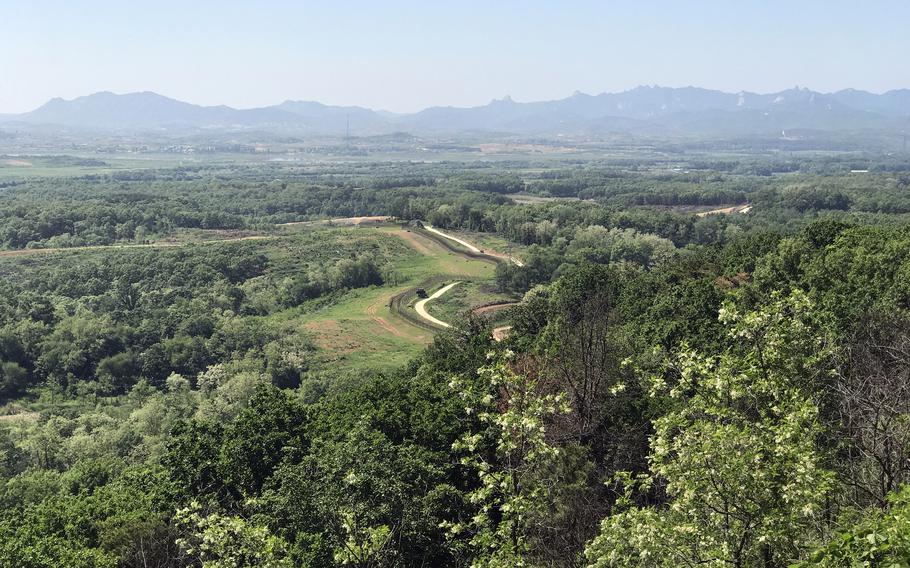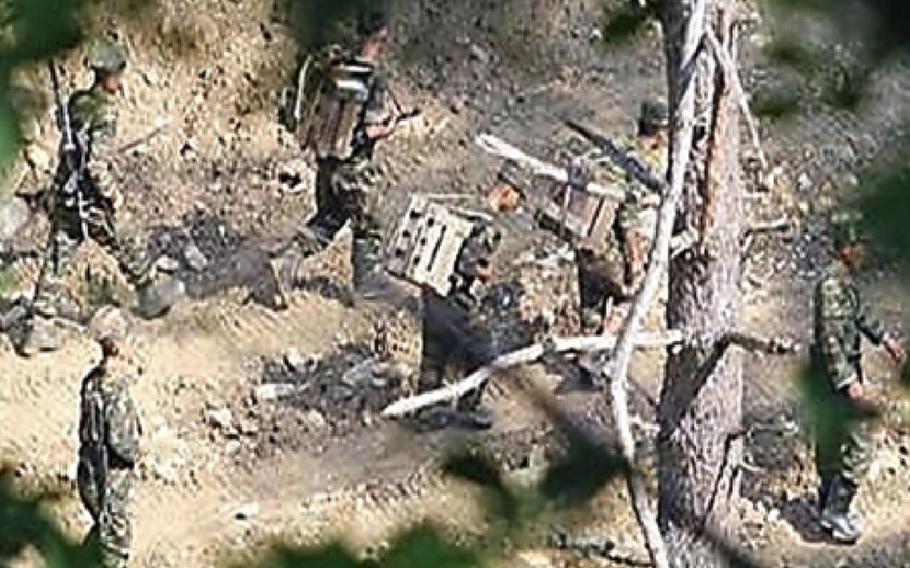
A portion of the Demilitarized Zone between North and South Korea is pictured on May 24, 2017. (Aaron Kidd/Stars and Stripes)
CAMP HUMPHREYS, South Korea — South Korea’s military has warned that heavy rains may dislodge small, camouflaged land mines the size of leaves planted by North Korea inside the Demilitarized Zone.
Since April, the North has been deploying mines that resemble tree leaves in the northern region of the DMZ, which divides the Korean Peninsula, an unnamed South Korean Joint Chiefs of Staff official said Wednesday, according to a Yonhap News report that day.
These land mines, colored green and brown, contain about 1.4 ounces of explosives and are among tens of thousands of mines the South Korean military believes are buried in the DMZ, the official said in the report.
The mines are difficult to see “with the naked eye” and the South’s Ministry of National Defense has not ruled out the possibility of the explosives being moved by torrential waters during the summer, the official reportedly said.
Seoul routinely urges Pyongyang to warn the South of water discharges from its dams, particularly during the summer, the rainy season. Flooding caused by unexpected discharges from North Korean dams killed six South Koreans in 2009.
“We are currently facing a complex crisis in which we must prepare for the threat of North Korean provocations and unpredictable natural disasters,” Defense Minister Shin Won-sik said in a Joint Chiefs news release Wednesday.

North Korean troops work inside the Demilitarized Zone between North and South Korea in this undated photo provided by the South's Joint Chiefs of Staff on July 17, 2024. (South Korea’s Joint Chiefs of Staff)
North Korea last released a small amount of water without warning on July 9, according to a news release that day from the South’s Ministry of Environment. The ministry said South Korea began releasing water from its own dams throughout the country last week due to the increased water levels.
The South’s military reported an uptick of North Korean soldiers laying mines, reinforcing roads and constructing barriers on their side of the border starting in April. Some of the soldiers were injured after inadvertently triggering at least 10 landmines, according to the Ministry of National Defense.
These North Korean working parties, composed of both men and women, worked around the clock in 12- to 13-hour shifts and lived in squalid conditions inside makeshift tents, the ministry said in a news release Wednesday.
The ministry is preparing for the possibility that some of the North Korean troops may cross the border to defect, due to their living conditions, according to the release.
South Korea’s military has detected North Korean soldiers crossing the DMZ on multiple occasions since June. Those crossings prompted South Korean soldiers to fire warning shots and make loudspeaker broadcasts ordering the intruding forces back across the border.
Relations between the two Koreas have soured after both countries withdrew from a military deconfliction agreement that set limits to military exercises and flights near the DMZ.
Seoul in November partially suspended the agreement after Pyongyang launched a military satellite. Afterward, North Korea completely scrapped the accord.
Seoul formally withdrew from the agreement in June and resumed artillery drills near the DMZ after Pyongyang sent thousands of balloons carrying trash across its southern border.